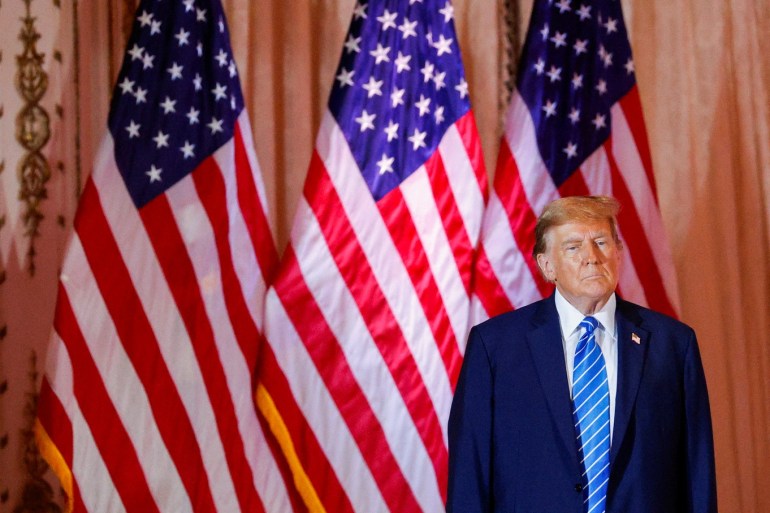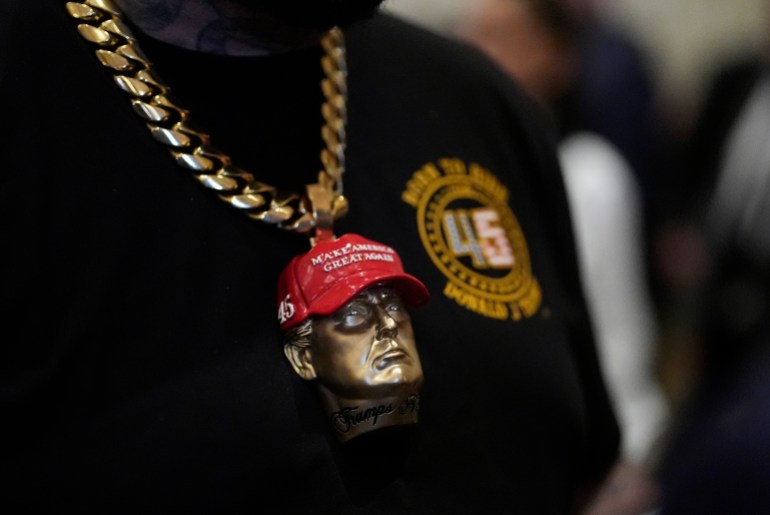It was the small races that signalled trouble in the United States’ Super Tuesday elections.
As expected, Republican frontrunner Donald Trump and Democratic incumbent Joe Biden both cruised to easy victories in the vast majority of the night’s primaries — the contests that ultimately decide who receives major party nominations.
But underdog candidate Nikki Haley denied Trump a clean sweep on the Republican side with her victory in the small northeastern state of Vermont, where she resonated with moderate voters.
The result offered a glimmer of hope for Haley, a former United Nations ambassador and South Carolina governor. Haley has long trailed Trump in national and state-level polls. Her victory in Vermont, however, comes on the heels of her win in Sunday’s Republican primary in Washington, DC — two results that may fuel her long-shot campaign to continue chugging along.
Likewise, Biden faced protests at the ballot box over his stance on Israel’s war in Gaza. He also suffered a relatively minor loss in the US territory of American Samoa.
Super Tuesday marks the most pivotal date on the primary calendar, as the day when the most states vote. They included the two most populous — California and Texas — as well as battleground states like Minnesota and Virginia.
As a result, nearly a third of all party delegates for both Democrats and Republicans were up for grabs. While the night’s results were not enough for Trump or Biden to clinch their party’s nominations, they have both made significant strides in reaching the delegate threshold needed. A rematch of their match-up in the 2020 presidential race appears all but certain.
Here are five takeaways from the 2024 Super Tuesday results.

Haley wins big in Vermont
Super Tuesday has long been the bullseye that the Haley campaign has been aiming for.
“That’s as far as I’ve thought, in terms of going forward,” she said during the South Carolina primary, a race in her home state that she ultimately lost.
But she pledged to keep going, and her efforts were rewarded on Super Tuesday with a key symbolic victory in Vermont, a state in the left-leaning New England region.
Her campaign, however, still faces questions about its longevity: Donors like the Americans for Prosperity super PAC stepped away from her presidential bid in the wake of her defeat in South Carolina.
Michael Fauntroy, a political science professor at George Mason University, told Al Jazeera that Haley’s Super Tuesday performance might be less significant as a reflection of her success — and more indicative of the weaknesses Trump faces going into the general election.
“If you look at many of the closely contested swing states that we’ve seen so far, including some tonight, there are roughly 20 percent to maybe even a third of Republican voters in those states who are voting for Nikki Haley,” he said.
“And in a closely contested state like Michigan or Wisconsin, perhaps even North Carolina, if those voters stay home in November or just can’t bring themselves to vote for former President Trump, then former President Trump cannot win those states. And if he can’t win those states, he can’t win the election.”

Protest vote against Biden spreads
Super Tuesday has likewise forced Biden to confront the vulnerabilities in his campaign. A protest campaign that started largely in Michigan continued to exert influence over the day’s races.
In last month’s Michigan primary, grassroots movements called on voters to choose the “uncommitted” option on their ballot instead of Biden, as a rebuke to his stance on Israel’s war in Gaza.
Biden has long touted his “rock-solid” support for Israel, even as its military offensive in the Palestinian enclave elicited concerns about the risk of genocide and famine. More than 30,000 Palestinians have died in Israel’s military campaign so far.
The “uncommitted” movement ultimately pulled an estimated 101,000 votes in the Michigan primary — or approximately 13 percent of the total ballots cast.
The push to vote “uncommitted” remained strong on Super Tuesday. That was particularly apparent in Minnesota, a key swing state in the Midwest. Early results showed that “uncommitted” was in second place in that state’s Democratic primary, with nearly 20 percent of the vote.
That could spell trouble for Biden in the general elections, as he faces drooping poll numbers — and a tight race against his likely opponent Trump.

Senate race in California deals blow to progressives
One of the biggest down-ballot primaries was the race to replace the late Senator Dianne Feinstein, who passed away last year after more than three decades representing California.
To decide which two candidates would proceed to the general elections in November, California held a “jungle primary”, where Senate hopefuls from any party could participate. It proved to be a fatal contest for the race’s two most prominent progressives, Representatives Barbara Lee and Katie Porter.
Both women had decided against running for re-election to the House of Representatives in order to compete in the Senate race. It was a high-stakes gamble. The two representatives had developed national profiles, Lee as an antiwar figure and Porter as a champion against corporate overreach.
Their fellow US representative, centrist Democrat Adam Schiff, handily emerged as the frontrunner on Super Tuesday, despite criticism for his pro-Israel stance amid the Gaza war. But Lee and Porter were ultimately edged out by a Republican with no previous political experience: former baseball player Steve Garvey.
The result has left their political careers in question — and Porter’s congressional district vulnerable to being flipped. Control of both the House and the Senate are up in the air this November.

A referendum on Trump’s grip over Republicans
Other hotly anticipated races revolved around gauging just how strong Trump’s sway over the Republican Party is.
In the Republican stronghold of Texas, for instance, one state-level race showed how fierce the internal power struggle has become.
Two-term state Representative Dade Phelan had gained a relatively high profile as Texas’s Speaker of the House — a powerful figure in the state’s politics — and this year, he was up for re-election.
But he had spurred the ire of the far-right flank of his party by overseeing the recent impeachment of Attorney General Ken Paxton, a Republican provocateur known for challenging the Biden administration in the courts. Paxton had also previously petitioned the US Supreme Court to reject Biden’s victory in the 2020 presidential election, in support of Trump’s false claims of voter fraud.
In the Super Tuesday primary, Phelan came to represent the more establishment branch of the Republican Party, while his adversary David Covey enjoyed the endorsements of Trump and Paxton.
The Republican race was so close, however, that it is set to go to a runoff in May, teeing up another battle for the soul of the party.

Biden and Trump look ahead to November showdown
Despite a wobble for Biden in American Samoa and a loss for Trump in Vermont, the two frontrunners seem destined for a rematch in November’s general elections.
They each offered a glimpse of their campaign strategies moving forward, with comments released in the midst of the Super Tuesday results.
Trump took the stage in person at his Mar-a-Lago resort in Palm Beach, Florida, greeting a ballroom full of supporters for an election-night watch party.
As he spoke, though, Trump revisited familiar themes: The United States was in decline, he said, and only he could reverse the slide. He made no mentions of Haley, his only major Republican rival left standing, focusing instead on Biden.
“He’s the worst president in the history of our country,” Trump said of Biden, blaming the Democratic incumbent for inflation, the immigration crisis at the US-Mexico border and conflicts in Ukraine and Gaza. “We’ve watched our country take a great beating over the last three years.”
Biden likewise returned to his familiar playbook, warning that Trump represented an existential threat to US democracy.
“My message to the country is this: Every generation of Americans will face a moment when it has to defend democracy,” Biden said in a Super Tuesday statement. A centrist, he framed himself as the candidate of unity, offering a preview of his appeal to voters in November.
“To every Democrat, Republican, and independent who believes in a free and fair America: This is our moment. This is our fight.”









